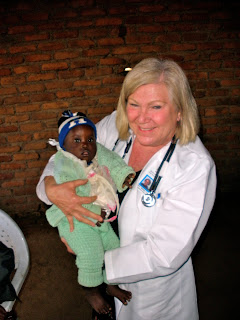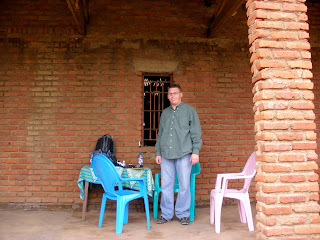




A group of folks (Baptists) from Oklahoma (Madill and Ada) came into Malawi last week. They graciously carried a bag of medical supplies for us, and were joined by a doctor and his family after a few days. They arranged to set up some village medical clinics on Monday and Tuesday. Jose went on Monday, and both of us on Tuesday (since it was Malawian Independence day and the ABC clinic was closed). The doctor quickly saw that Jose's experience was a very good thing, and set him up to manage all the malaria patients, along with the general body pains (GBP - very common), the coughs and colds, etc. Jose was able to treat most of the problems himself. The village clinics usually have no or very limited testing abilities, and limited medications. Last year Jose was the 'pharmacist' in the clinics we did, so he became familiar with the meds and the dosages. He would listen as I took a history (via translator) and would usually know what meds and dosages I would order before I ordered them! So he was ready to be Dr. Joseph. Tuesday, since I was there, Jose was the 'triage' person / doctor. He and his translator, Charles (more on him later) would get a chief complaint, do blood pressures, check pulse and oxygen level if appropriate, and if the problem was a simple general body pain - he would order the medications from the triage station and they would go to pharmacy. I think we need to use his skills and knowledge more in future clinics (if we have the man power). Monday they saw about 160 folks and Tuesday we saw 180. Of course, many of the cases are heart breaking. One child had been normal, then had cerebral malaria and now cannot walk, talk, or interact. She just cries and squirms. I am sure she has had significant brain damage from that episode of malaria. We saw lots of cataracts, joint pains that are incredibly crippling for the older folks: they still have to walk everywhere, till the fields, carry the water, stir the nsima, etc. One sweet baby girl (10 mo old) came in for a cough. She had Downs' syndrome (Trisomy 21) and no one had ever told the mom. She had no idea why her baby was different, no idea what to look out for or to expect long term. It was heartbreaking to be the one to tell her. I saw a child with sickle cell disease - the mother had the medical 'passport' and could turn to the page where the hospital had diagnosed her, but had no idea what it meant. Makes me a little crazy that most of the time the medical folks here do NOT explain what the diagnosis means, especially when it is a long term problem. We saw the usual malaria, huge spleens, weird rashes, high blood pressure, aches and pains, bilharzia, and cough /cold. Here they call it 'asthma' (sometimes it is) or - if it is acute- the 'flue' or flu -or they are fluy or fluish. A lot of it is the dust - as the dry season begins, there is dust everywhere, everywhere... and the smoke from cooking fires. Because most of the village folk are medically naive, they have interesting descriptions and rationale for their symptoms. We forget how much medical information Americans get just from general TV (ER, Marcus Welby, Grey's Anatomy, etc. ) and from commericals ('ask your doctor if it is right for you')... they have none of that here. They usually can't tell you if something makes it better or worse, they have tried no over the counter meds (they usually can't get them or can't afford them in the village, but even at the ABC clinic they don't try things), they can't tell you how long they have had the pain, if they have been diagnosed with anything in the past, etc. etc. It is a challenge if the patient is the least bit complicated. I have found that if my translator is an ABC student, he or she will soon figure out what questions need to be asked and pursue that. If not, eeesh, (as they say here), it will be a tedious history. Charles, (Jose's translator) is an ABC student and one of our guards. He was posted at our house and found out Jose was doing a village clinic Monday and wanted to come to help (after working all night). He did great. Tuesday he came also (sleeping in small bits between guard duty and village clinic duty), and Jose said Charles was able to get almost the entire history without any prompting from him. I just love the ABC students! These guys - and girls - are the cream of the crop. It is a shame that the school is small and (for here) relatively expensive. There are some great minds here and they need to be cultivated!
Pictures: Me holding the Down's baby, the chimbuzi (outside squatty potty, in the grass 'hut'), the translators - Dadilitso (sp?) and Charles (in green), Dr. Joseph at Tuesday clinic, outside, by his station, and lastly a photo of Dr. Joseph and a patient from the Monday clinic. Enjoy!
No comments:
Post a Comment